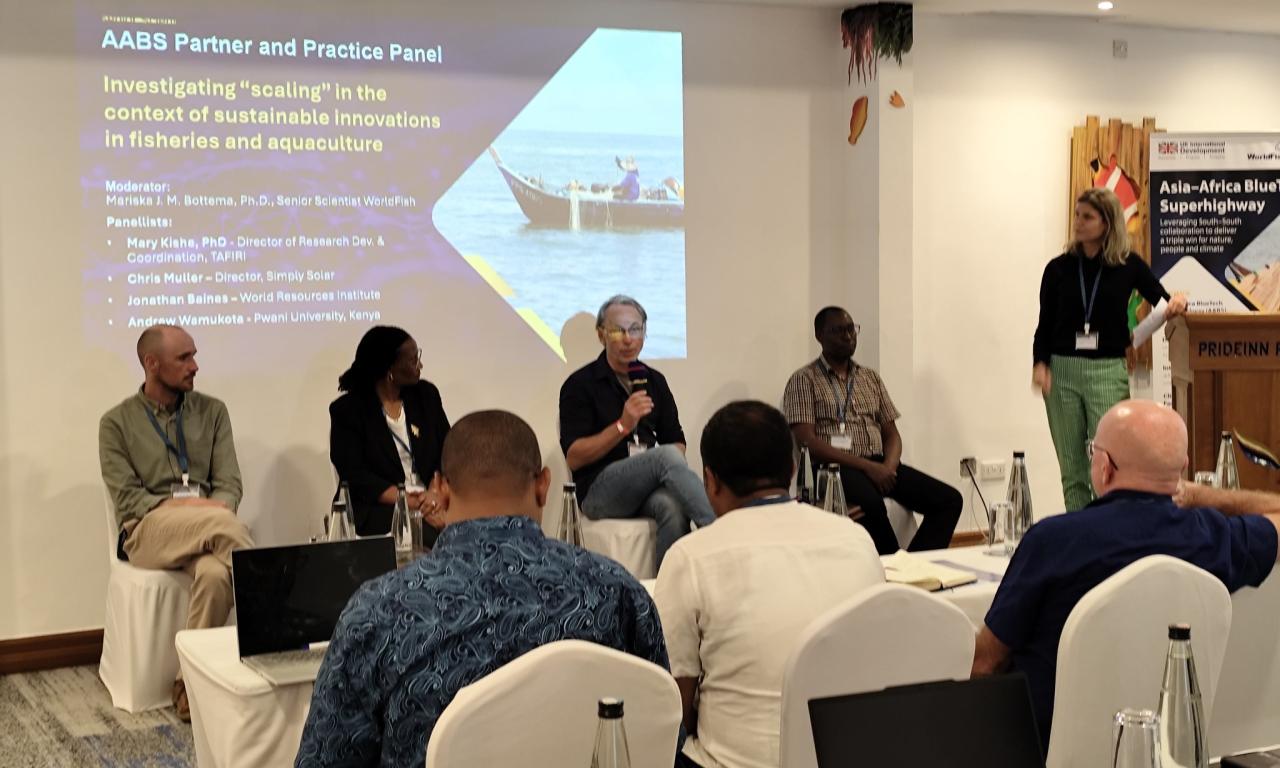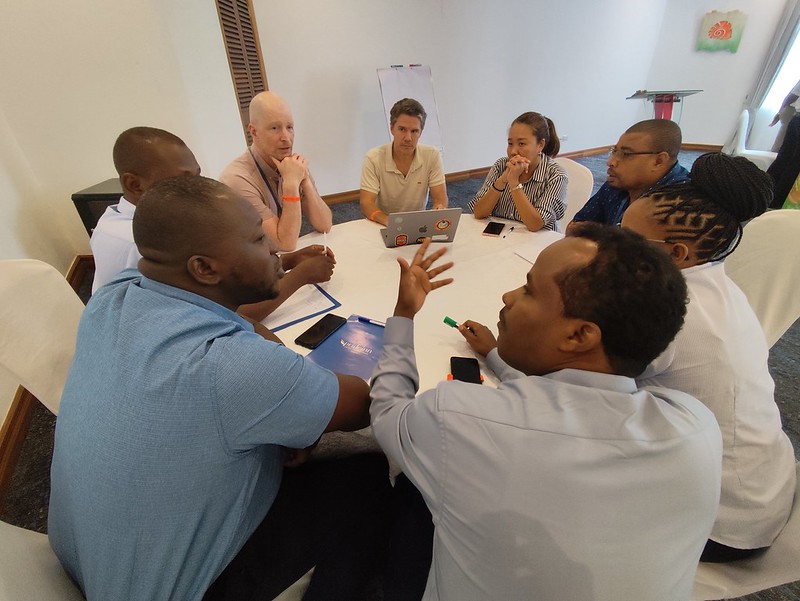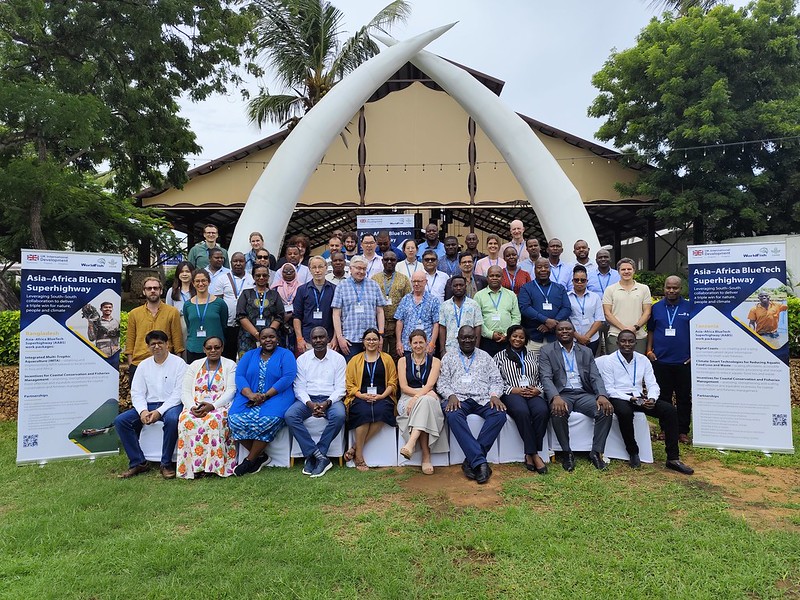
In May 6-8, 2025, in Mombasa, Kenya, Annual Planning and Partner Meeting took place for Asia-Africa BlueTech Superhighway (AABS) project. The meeting brought together key stakeholders from over 15 countries to advance sustainable aquatic food systems across Asia and Africa. This three-day meeting served as an important platform for collaboration, knowledge exchange, and strategic planning.
Platform for Coordination, Adaptation, and Collaboration
The AABS Annual Meeting is a critical forum for aligning efforts across multiple countries and partners, enabling the project to adapt to the evolving challenges and opportunities in aquatic food systems. As part of the Climate and Ocean Adaptation and Sustainable Transition (COAST) programme, funded by UK International Development under the Blue Planet Fund, this gathering plays a vital role in strengthening implementation quality, enhancing collaboration, and fostering South-South learning.
Participation and Key Discussions
This year’s meeting brought together 50 participants representing diverse partners, WorldFish staff, and stakeholders from Mozambique, Kenya, Tanzania, Nigeria, Bangladesh, and beyond. The agenda focused on collaborative planning, integrating lessons learned, and setting priorities for continued work.
The sessions covered a broad range of themes including innovative technologies for sustainable fisheries, systems-based approaches using theories of change, and strategies for inclusive development incorporating gender equality, disability, and social inclusion (GEDSI). Presentations highlighted the importance of stakeholder engagement at all levels and the use of participatory systems mapping to better understand complex aquatic ecosystems and improve project outcomes.
Participants critically reviewed progress during AABS’s second year, celebrating successes such as strong community partnerships, completion of approximately 40 assessments, and the development of gender-responsive interventions. Challenges discussed included clarifying project activities, improving coordination across components, enhancing information sharing, and strengthening reporting mechanisms.
In response, the team committed to improving work planning and partnership management, scaling efforts through private sector and government collaboration, and establishing sustainable transition pathways.
A panel on scaling sustainable fisheries innovations emphasized the importance of learning from past experiences, applying co-design principles, and adapting strategies as needed rather than adhering rigidly to donor expectations.

Strategic Approaches and Learning
The meeting highlighted the application of theories of change to deepen stakeholder engagement and improve project design, alongside a review of monitoring, evaluation, and learning (MEL) processes that track progress and impact. Participants reflected on key achievements and challenges from the past year, emphasizing the need to enhance coordination, clarify project activities, and strengthen partnership management to drive sustainable outcomes.
Inclusive Value Chains and Private Sector Engagement
The meeting emphasized strengthening private sector partnerships across AABS focal countries, targeting diverse actors such as financial institutions, technology providers, telecom companies, fish processors, hatchery owners, and fish seed suppliers. Integration of gender equality, disability, and social inclusion (GEDSI) was highlighted as a fundamental component for equitable and sustainable aquatic food systems, with collaborative exercises focused on empowering men, women, youth, and persons with disabilities.
The importance of South-South knowledge sharing was also underscored as key to adapting solutions to local contexts. This includes research collaborations, exchange visits, workshops, and accessible online content in local languages. Afternoon sessions explored social and economic investments in coastal conservation and sustainable fisheries, concluding with discussions on opportunities to strengthen AABS in its third year.

Country-Specific Plans and Activities
The meeting concluded with a detailed review of country-level plans for the upcoming year:
- Kenya will advance to an action-oriented phase by piloting six Integrated Multi-Trophic Aquaculture (IMTA) systems, developing aquaculture value chain business models, expanding climate-smart technologies such as solar-powered cold chains, and enhancing fisheries monitoring through digital tools including vessel tracking and interactive dashboards.
- Nigeria will establish brackish water IMTA pilot models in key coastal states, introducing diverse aquaculture species to promote environmental resilience and species diversification.
- Mozambique plans to deploy Pelagic Data System devices on approximately 150 fishing vessels and train enumerators in digital data collection methods, supporting adaptive fisheries management through improved data systems.
- Tanzania aims to pilot innovations to reduce post-harvest fish losses, analyze value chains for dry and fresh fish, enhance the resilience of small-scale fisheries, promote sustainable fishing practices, and strengthen relevant legal and institutional frameworks.
- Bangladesh will focus on farmer-centric activities including piloting IMTA systems, developing aquaculture value chains, promoting seaweed and green mussel cultivation, conducting feed trials and certification, and supporting private sector marketing initiatives.
The meeting set a strong foundation for the third year of AABS, positioning the project to deliver impactful, inclusive, and sustainable solutions for aquatic food systems across Asia and Africa.
